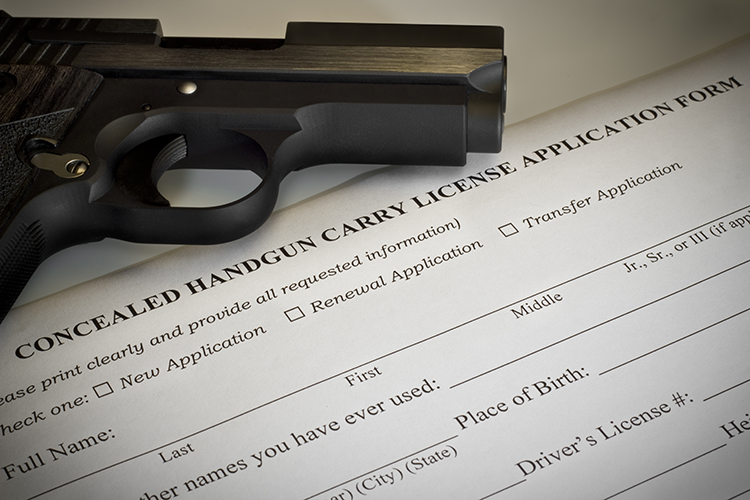Second Amendment protects right to carry a handgun outside the home, Supreme Court rules

Image from Shutterstock.
The U.S. Supreme Court on Thursday struck down New York’s requirement that “proper cause” must be shown to obtain a concealed-carry gun license.
The high court ruled 6-3 that the Second Amendment protects a person’s right to carry a handgun for self-defense outside the home, and that New York’s law violated that right.
Justice Clarence Thomas wrote the majority opinion.
“Because the state of New York issues public-carry licenses only when an applicant demonstrates a special need for self-defense, we conclude that the state’s licensing regime violates the Constitution,” Thomas wrote.
The Supreme Court ruled in New York State Rifle & Pistol Association Inc. v. Bruen. The New York law at issue required proper cause for concealed-carry licenses but banned the open carry of firearms entirely.
The plaintiffs in the case were the New York State Rifle & Pistol Association and two individuals who were denied concealed-carry permits for self-defense. They had claimed that New York’s gun licensing law made it “virtually impossible” for ordinary citizens to obtain a concealed-carry permit.
The case is the Supreme Court’s third major gun ruling since 2008.
The Supreme Court ruled that year in District of Columbia v. Heller that the Second Amendment protects the right to have guns at home for self-defense in Washington, D.C., a federal enclave. The court extended the ruling in 2010 in McDonald v. City of Chicago, when it ruled that the Second Amendment applies to state and local governments through the 14th Amendment.
But the Supreme Court has not previously ruled on the right to carry guns outside the home.
We “now hold, consistent with Heller and McDonald, that the Second and 14th amendments protect an individual’s right to carry a handgun for self-defense outside the home,” Thomas wrote.
Thomas’ majority opinion rejected a two-step approach used by federal appeals courts to resolve Second Amendment issues. That approach partly relies on a “means-end” scrutiny that considers government’s interest in the gun regulation.
The majority outlined a different approach that relies on the Second Amendment’s text and historical tradition.
“When the Second Amendment’s plain text covers an individual’s conduct, the Constitution presumptively protects that conduct,” Thomas wrote. “The government must then justify its regulation by demonstrating that it is consistent with the nation’s historical tradition of firearm regulation.”
The New York gun regulation is unconstitutional, Thomas said, because there is no historical tradition of banning carrying guns in public absent a showing of special need.
Concurring justices stressed the limits of the majority decision.
In a concurring opinion, Justice Samuel Alito said the majority’s holding “decides nothing about who may lawfully possess a firearm or the requirements that must be met to buy a gun. Nor does it decide anything about the kinds of weapons that people may possess.”
Justice Brett Kavanaugh wrote another concurring opinion, joined by Chief Justice John Roberts. He stressed that the majority decision addresses “may issue” licensing regimes used only by six states, including New York.
“As the court explains, New York’s outlier may-issue regime is constitutionally problematic because it grants open-ended discretion to licensing officials and authorizes licenses only for those applicants who can show some special need apart from self-defense,” Kavanaugh wrote.
The decision today does not address “shall issue” regimes used in 43 states, Kavanaugh said. Those jurisdictions have requirements, such as a background check and firearms training, but they do not grant the state open-ended discretion to deny a gun license.
“Going forward, therefore, the 43 states that employ objective shall-issue licensing regimes for carrying handguns for self-defense may continue to do so,” Kavanaugh said.
Justice Stephen Breyer dissented in an opinion joined by Justices Sonia Sotomayor and Elena Kagan. He cited statistics showing that 45,222 Americans were killed by firearms in 2020, and that 277 mass shootings have happened so far this year.
States have tried to address violence with gun laws, but the majority decision today “severely burdens states’ efforts to do so,” he wrote.
“In my view, when courts interpret the Second Amendment, it is constitutionally proper, indeed often necessary, for them to consider the serious dangers and consequences of gun violence that lead states to regulate firearms,” Breyer said.
The ABA had argued in an amicus brief that state and local governments should have flexibility to fashion concealed-carry regulations in light of public safety and other local considerations, within constitutional constraints.
Breyer cited information in the ABA amicus brief three times. He cited ABA information about gun violence and road rage, about the New York law’s flexibility to address the needs of specific areas, and about the shall-issue states that still give some discretion to licensing authorities.
ABA President Reginald Turner released a statement Thursday.
“The American Bar Association is deeply disturbed by the toll gun violence has exacted upon our country as more than 40,000 Americans die every year from guns through homicides, suicides and unintentional shootings. The ABA has studied firearm regulation for more than a century and believes gun violence can be reduced by evidence-based policies that are fully consistent with the Constitution,” Turner said.
“In an amicus brief cited multiple times by the dissenting justices, the ABA argued that pursuant to association policy, the right of state and local governments to tailor firearms regulations should be based on local considerations and is a critical component of a state’s police powers,” Turner wrote.
“The ABA urges Congress to enact sensible and evidence-based legislation to help reduce the scourge that gun violence has wrought on our nation. The association applauds current bipartisan efforts in Congress that reached a tentative agreement on some important measures, including enhancements to background checks, criminal penalties for certain gun purchases and incentives to states that enact red flag laws. While the agreement is not perfect, the ABA urges Congress to build on this progress and swiftly enact legislation that will help make all people in our country safer,” he said.
Hat tip to SCOTUSblog, which had early coverage of the opinion.
See also:
ABAJournal.com: “Supreme Court appears ready to rule against restrictions on concealed-carry permits”
ABAJournal.com: “Supreme Court revisits Second Amendment with challenge to New York concealed-gun restrictions”
Updated June 23 at 12:45 p.m. with additional information about Justice Stephen Breyer citing information in the ABA’s amicus brief. Updated June 23 at 2:03 p.m. to add ABA President Reginald Turner’s statement.



